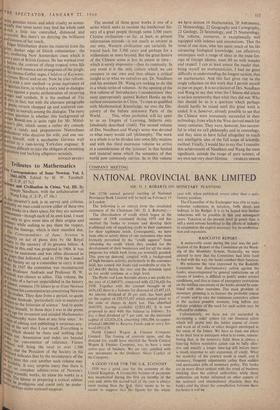Tributes to Mathematics
he Correspondence of Isaac Newton. Vol. I, 1661-1675. Edited by H. W. Ttirnbull. 0 stip (C.U.P., i'..7 7s.) at '-`11ce and Civilisation in China. Vol. III. By Joseph oseph Needham, with the collaboration of ir 11 Wan Ling. (C.U.P., V 10s.) ,, Ole revg iewer's task is to survey and criticise, vrobably no man could review either of these two 113,ble books in a short space, for they are national h4,,. unients—though each of its own kind. I want ,-C Only to give some idea of .their origins and `ii"ntenrs while seeking to pay them the respect, l‘i,e,ed the homage, which is their manifest due. ltd Correspondence of Isaac Newton is °I,'Irl)rii., ,i 1Y an act of pious duty by the Royal Neb-,etY to the memory of its greatest fellow. A e '`ine to this end was projected in 1904. It was the ,,t° be enormous and was often diScussed in t )1 the that followed, and in 1938 the Council eir,,-,e Society set up a committee to carry it into Toilld;;; In 1947 the committee was reconstructed Professor Andrade and Professor H. W. ilreir,H,.bot1 was chosen as editor. This volume, the or" lruits of a harvest unparalleled in the history or iti,ence, contains 156 letters to or from Newton or Cvveen his contemporaries concerning Newton Prof's studies. They date from a period, to quote vo,,`essor Andrade, 'particularly rich in matters of Ne,,'ern to the historian of science.' And to quote of rh"le'n himself, 'in those days I was in the prime itoopY age for invention and minded Mathematics 't pi: hi°sophy more than at any time since.' As thin-ee uf editing and publishing it surpasses any- tilet. °f the sort that 1 can recall. Everything is hhonel,,Which should be there and nothing that praise n„ ot. Annotation and index are beyond voln-„` tor convenience of reference. Future t letter will bring the total to over 1,500 fOrer' and the President of the Society in his S,,„.ord indicates that by the tercentenary of the -.4e, be av`,Y, later this year another such volume may 411 1- nS Me. It may surprise many that there is Yot Driot 00 complete edition 'even of Newton s '401" scientific works, let alone his works as a Aotiieo. The labour in preparing a critical edition Liken be Prodigious and could only be under-
Prhaps under national auspices.
The second of these great works is one of a series which seeks to recount the intellectual his- tory of a great people through some 3,500 years. Chinese civilisation—so far, at least, as present information extends—is not nearly as ancient as our own. Western civilisation can certainly be traced back for 5,500 years and perhaps for a millennium or more beyond. But the great feature of the Chinese scene is less its extent in time— which is surely impressive—than its continuity. In any event it is the only culture which we can compare to our own and thus obtain a critical insight as to what we ourselves are. Dr. Needham and his assistant Dr. Wang are seeking to do this in a whole series of volumes. At the opening of the first volume of 'Introductory Considerations' they most appropriately quoted Robert Hooke on the earliest missionaries in China. `To men so qualified with Mathematical Knowledge, we owe the Dis- covery of the before unknown Parts of the World. . . . This, when perfected, will lay open to us an Empire of Learning, hitherto only fabulously described' (1686). The second volume of Drs. Needham and Wang's series was devoted to what many would call 'philosophy.' The work as a whole is to be divided into some fifty sections and with this third enormous volume we arrive at a consideration of the 'sciences' in that limited and material sense which the semantics of that world now commonly carries. So in this volume we have section 19 Mathematics, 20 Astronomy, 21 Meteorology, 22 Geography and Cartography, 23 Geology, 24 Seismology, and 25 Numerology. The volume, moreover, is exceptionally well equipped with indexes and annotations. That the mind of one man, who has spent much of his life advancing biological knowledge, can effectively encompass such a range of ideas in the most for- eign of foreign idioms, must fill us with wonder and respect. I can at least assure the reader that, being myself no mathematician, I had no great difficulty in understanding the longest section, that on mathematics. And this fact gives rise to the single reflection on this work that I permit myself to put on paper. It is no criticism of Drs. Needham and Wang to say that what the Chinese did attain is no less noteworthy than what they did not. Why this should be so is a question which perhaps should hardly be raised until this great work is ended. It is, however, already possible to see that the Chinese were immensely successful in their technology,from which the West derived much for many centuries. They were, however, less success- ful in what we call philosophy and in cosmology, and they seem to have failed altogether to reach any intelligible idea of the full scope of scientific method. Finally, I would like to say that I consider this achievement of Needham and Wang the most significant, outside the range of pure science, of my own not very short lifetime. CHARLES SINGER


































 Previous page
Previous page